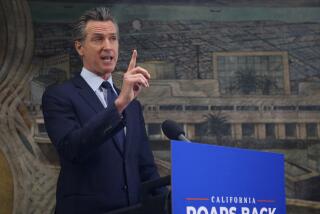The California GOP’s stimulus dodge
One of the keys to finally closing a state budget deal may be a controversial package of economic stimulus measures, either in the form recommended by Gov. Arnold Schwarzenegger in the unsuccessful special session of the Legislature that came to a close after Thanksgiving, or with some tweaks here and there to satisfy various constituencies.
As things stand, Democrats are expected to come back with the same budget proposals they put forward last month, with cuts to meet half the projected shortfall of $28 million over 18 months and a call for Republicans to fill in the rest with concessions on revenue -- meaning taxes, fees or some combination.
The rub is that most of the GOP minority in the Assembly and Senate have signed no-tax pledges, and they have shown no hint of giving in. As California moves closer to shutting schools and health clinics, and as the prospect of default looms, many Republicans believe that their opportunities to remake the state budget to conform with their political worldview -- smaller government, lower taxes -- are enhanced. Democrats, the thinking goes, will be stuck with the blame for the budget collapse, so there is little incentive for Republicans to back away from their pledges.
Lately, however, there have been some suggestions -- nothing overt, but various winks, nods and smoke signals -- that Republicans might give in on some revenue (none dare call it “taxation”) if they get something in return.
Democrats answer that they already gave, in the form of agreement to deep cuts in education, healthcare, aid to seniors and help for Californians whose needs are growing even more acute with the continuing economic trouble. They cite economic studies that suggest cuts damage a failing economy even more severely than tax increases. What more can they give?
That’s where the stimulus package comes in. Doesn’t it make sense, some Republican lawmakers say privately, to answer any economy-damaging measures such as tax increases with something to stimulate the economy, to at least break even? Something like, say, loosening state rules on overtime and meal breaks?
The 29-minute meal break
The argument goes like this: Among the 50 states, California’s regulations protecting the eight-hour day and guaranteeing meal breaks are the most stringent. For example, if a worker clocks in after a 29-minute meal break instead of the full 30 minutes allotted by law, the company automatically owes the employee an extra hour of pay as a penalty for cutting the break short -- even if returning to work early was the employee’s decision. Trial lawyers run ads soliciting employees to join class actions to win millions of dollars in supposed penalties against companies for inadvertently breaking meal-break laws. Companies claim to have spent millions of dollars in timekeeping software to prevent such costly breaches. Stories circulate around the Capitol about employees fired for returning to work early once too often.
Same on overtime. Wouldn’t it make sense, businesses ask, to give workers the flexibility to choose to work 10 hours one day and six the next? As long as employees get overtime for working more than 40 hours in a week, as federal standards require, what’s the problem? What sense does it make to allow someone to call in sick, collect a full day’s pay, then show up after all for a couple of hours and collect time and a half? How much of a hardship would it be to allow a meal break after six hours on the job instead of five?
Lawmakers, including Democrats, already agreed last year to change the law to exempt high-paid software engineers who, according to executives at several Silicon Valley firms, would otherwise have to be transferred to other states or have their work outsourced overseas. Other business leaders want the same flexibility, and they argue that the change would allow them to save money they must now spend complying with regulations and fighting lawsuits. The savings would allow them to keep more workers on the payroll, providing the best possible response to the economic emergency and balancing the negative effect of any tax increase.
But the flexibility on overtime and meal breaks -- or the “takeaways,” as labor groups call them -- is not a response to economic emergency. They have been a bone of contention since at least the Pete Wilson administration, when regulations were adopted eliminating the eight-hour day, and Gray Davis’ tenure, when they were reinstated.
Labor leaders argue that the GOP caucus and its business allies are simply using the budget crisis as their latest rationale for trying to sweep away hard-won worker protections that, so far, they have been unable to get through the Legislature. They compare the overtime and meal-break portions of the so-called stimulus package to the rollbacks of environmental protections that Republicans pushed for last year (but failed to get) as the cost of their support for a budget bill. California law already permits alternative workweek schedules and provides for “make-up time,” permitting up to a 10-hour day without overtime; if businesses were truly seeking work schedule flexibility, they would make better use of those tools.
Besides, Democrats argue, the worst thing to do in a slump is cut worker protections and shave take-home pay, especially for hourly wage earners who are more likely than higher-income executives or professionals to pump the full contents of their paychecks back into the economy. Franklin Roosevelt didn’t fight the Depression by weakening labor laws.
Is there room to maneuver? Democrats could expect to pay a steep political price for bucking unions on the eight-hour day and meal breaks, just as Republicans know they will suffer politically if they give in on taxes. Both sides might want to ask themselves whether there is any evidence that the proposed changes really would do anything to stimulate the economy. And if that doesn’t work, they should ask whether holding firm on their respective positions is worth deepening the state’s budget crisis.
More to Read
A cure for the common opinion
Get thought-provoking perspectives with our weekly newsletter.
You may occasionally receive promotional content from the Los Angeles Times.










